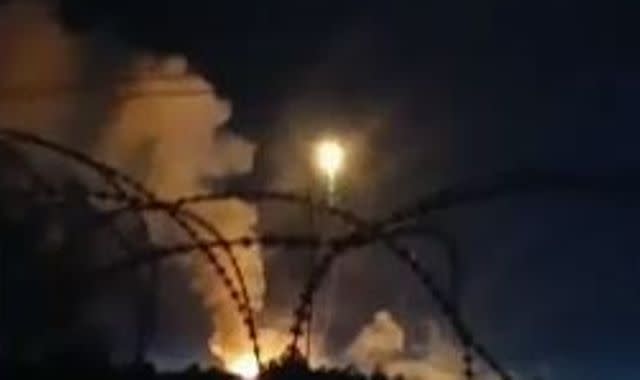What we know about the sites targeted in US strikes on Iraq and Syria

The US has launched airstrikes on Iraq and Syria targeting Iranian-backed militias.
The move comes in retaliation for a drone attack on an American base in Jordan that resulted in the deaths of three US service members.
It is the latest escalation in the Middle East that has been growing increasingly unstable since the Hamas attack on Israel on 7 October.
Middle East latest: US begins wave of airstrikes in Iraq and Syria
Here's what we know so far about the strikes:
Where has been hit?
The US has hit seven facilities, four in Syria and three in Iraq, where it believes Iranian-backed militias operate.
At least 85 separate targets within those facilities have been struck.
Among them were a weapons warehouse and three houses belonging to Kata'ib Hezbollah in Anbar province, western Iraq, according to an Iraqi official who spoke to NBC in Baghdad.
Numerous aircraft were used including long-range B-1 bombers flown from the US.
A statement from US Central Command said: "US Central Command (CENTCOM) forces conducted airstrikes in Iraq and Syria against Iran's Islamic Revolutionary Guards Corps (IRGC) Quds Force and affiliated militia groups.
"US military forces struck more than 85 targets, with numerous aircraft to include long-range bombers flown from United States.
"The airstrikes employed more than 125 precision munitions."
The strikes targeted "command and control operations, intelligence centers, rockets, and missiles, and unmanned aerial vehicle storages, and logistics and munition supply chain facilities".
Who has been targeted?
The strikes targeted the Quds Force - the foreign espionage and paramilitary arm of the IRGC that heavily influences its allied militia across the Middle East, from Lebanon to Iraq and Yemen to Syria.
US Lieutenant General Douglas Sims, the director of the Joint Staff, said it appeared the strikes were successful, triggering large secondary explosions as the bombings hit militant weaponry, though it was not clear if any militants were killed.
But Sims added the strikes were taken knowing there would likely be casualties among those in the facilities.
US defence secretary Lloyd Austin said President Biden had directed additional action against the IRGC and those linked to it.
"This is the start of our response," Mr Austin said.
"We do not seek conflict in the Middle East or anywhere else, but the president and I will not tolerate attacks on American forces," he added.
Read more:
Middle East latest - calls in US for 'devastating retaliation'
US drone response could lead to 'uncontrolled escalation'
But the Pentagon has said it does not want war with Iran and does not believe Tehran wants war either.
Syrian state TV reported that "several" people had been killed and injured "as a result of the American aggression on a number of sites at the Badia and the Syrian-Iraqi border".
What has been said?
President Joe Biden said: "This afternoon, at my direction, US military forces struck targets at facilities in Iraq and Syria that the IRGC and affiliated militia use to attack US forces.
"Our response began today. It will continue at times and places of our choosing.
"The United States does not seek conflict in the Middle East or anywhere else in the world. But let all those who might seek to do us harm know this: If you harm an American, we will respond."
The Iraqi military has said the strikes "constitute a violation of Iraqi sovereignty" and "undermine the efforts of the Iraqi government".
Analysis: US strikes may have unintended and far-reaching consequences
A spokesman added the US action posed "a threat that could lead Iraq and the region into dire consequences".
The Palestinian Mujahideen Movement said it "strongly condemned" the "new American aggression on sites in Syria and Iraq, which is an extension of the continuous American-Zionist-Western aggression on our nation and its resources".
An Iran-backed group in Iraq has accused Jordan, Kuwait and Saudi Arabia of letting the US use their territories to carry out attacks.
A spokesperson for the Sayyed al Shuhada Brigades, a brigade in Iraq's Popular Mobilisation Forces linked to Kata'ib Hezbollah, called on the Iraqi government to "interrogate" its foreign minister for allowing this to happen.
Its secretary-general Abu Alaa al Walae also called for an end to the presence of US troops in Iraq.
He praised the "heroes of the Islamic Resistance" who "humiliated the American occupation" with their attacks.

 Yahoo News
Yahoo News 
